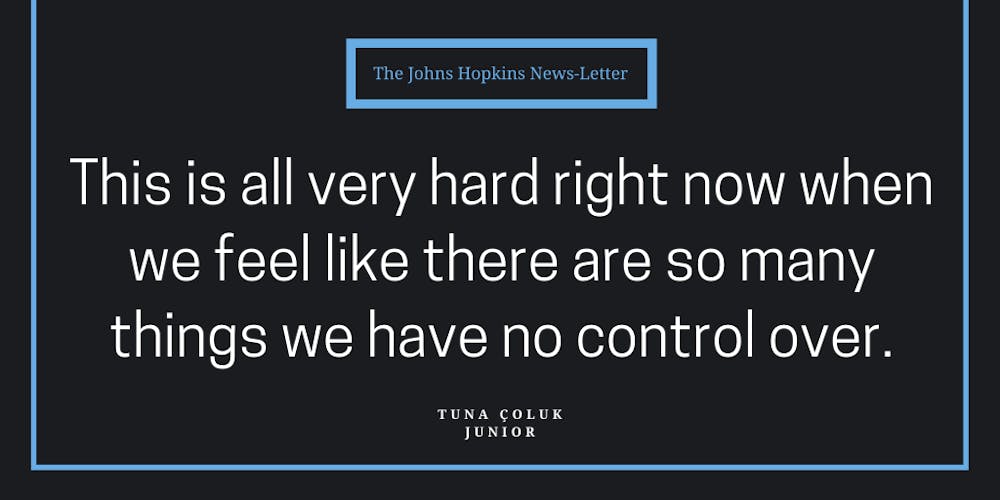Hopkins began its first week of remote instruction on Monday after cancelling all in-person classes for the spring semester due to COVID-19. For those who now live in different time zones, the transition to online classes has been especially challenging.
Junior Tuna Çoluk is an international student who returned to Turkey. In an email to The News-Letter, she wrote that she was already trying to find ways to work around a time difference of seven hours, which she is worried will negatively impact her online learning experience.
“I am contemplating whether I should live between the U.S. and Turkey time zones for a while to potentially do better in my classes,“ she said.
Freshman Nainika Pansari returned to India, which is 9.5 hours ahead of Baltimore. She said that this makes remote instruction a larger issue for her than it may be for others.
“I think my last class ends at 11:30 p.m.,” she said. “I don't know how it's gonna affect my studies... I'll have to study at night. I don't study well at night. So that might be a problem.”
As recent international travelers, both Pansari and Çoluk went into self-isolation upon returning to their homes. Çoluk explained that being confined to just a single room in her house was difficult for her and worried that that difficulty could compromise her academic performance during exams.
“I am used to taking exams in large classrooms in the mornings, not in a small bedroom... at 8 p.m.,” Çoluk wrote. “I just hope that the online instruction and examination will be handled in a way that doesn’t put additional stress over students during such a stressful time.”
Pansari said that so far, being at home has not been conducive to effective learning.
“With the whole quarantine situation, I have to stay at home and study. I don't like studying in my room. I like having a different study space to study.” Pansari said. “I learn better when I'm physically in a classroom with the professor teaching. And even if it's a big class, it just helps to be seated in a classroom.”
Another issue that Pansari raised was that even if her professors made their lectures accessible for her, their office hours may not be. She worried about how helpful going to office hours would be if she had to stay up the whole night to attend them.
“I don’t know how well office hours are going to be, even if I choose to wake up and attend,” she said. “I’ll be half-sleeping.”
In an interview with The News-Letter, Jennifer Culbert, an associate professor in the Department of Political Science, shared how she is working to accommodate some students of hers who returned to China.
“What I'm doing is recording our discussions, sending them records of the class discussion and then scheduling a separate discussion with them once a week, rather than the twice a week we have, to go over the discussion and engage in some of the questions with them separately,” she said.
Bloomberg Distinguished Professor Yannis Kevrekidis is working with a student of his who returned to Korea.
“Korea is not that terrible in the sense that 12:00 [p.m. Hopkins local time] is 1:00 at night [Korea local time]. It’s not completely inconceivable that somebody might stay up,” he said. “Maybe not for every lecture, but, for several of them, I hope he may be able to follow.”
Kevrekidis added that he hopes to check in with his students periodically to see what he may be able to do to accommodate their needs.
“We are going to have some discussion about what is it that we can do. And I hope within reason we can try and respond. So far, there is no terrible problem that has come up,” he said. “I hope none does.”
Culbert reported that she plans to do the same with her students.
“[With] this radical displacement of being plucked out of your regular college life, and put back in another context where you don’t usually engage in your academic life, it makes total sense to me that people would be suffering some adjustment problems,” she said. “I’ve said to my students that if I don’t hear from them, I’m going to chase them down. So if anybody is hiding their head under a pillow, I will try and find them to make sure that they're okay.”
Çoluk hopes that her professors and the University would understand the difficulties that a minority of Hopkins students share due to greater time differences. However, she also noted that being able to use online instruction at all is a privilege.
“This is all very hard right now when we feel like there are so many things we have no control over,” Çoluk wrote. “Administrators have been saying that they see this as ‘an opportunity for Hopkins to shine.’ They point out that we have the resources for online instruction, when many don’t. It’s important to remember that we will get through this more smoothly than others because we are privileged.”





